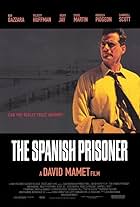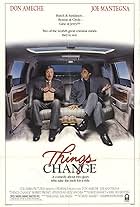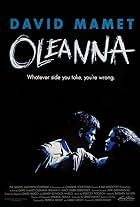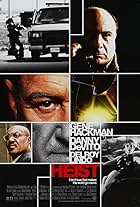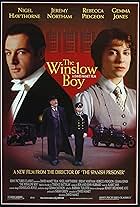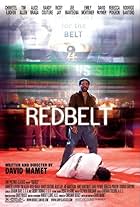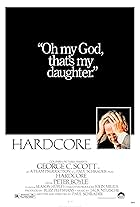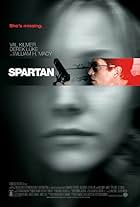A psychiatrist comes to the aid of a compulsive gambler and is led by a smooth-talking grifter into the shadowy but compelling world of stings, scams, and con men.A psychiatrist comes to the aid of a compulsive gambler and is led by a smooth-talking grifter into the shadowy but compelling world of stings, scams, and con men.A psychiatrist comes to the aid of a compulsive gambler and is led by a smooth-talking grifter into the shadowy but compelling world of stings, scams, and con men.
- Awards
- 6 wins & 5 nominations
- Billy Hahn
- (as Steve Goldstein)
- Sgt. Moran
- (as W.H. Macy)
Storyline
Did you know
- TriviaRicky Jay was a sleight-of-hand artist and an acknowledged authority on the art of the con. In an NPR interview, Jay related that when David Mamet needed a short-change scam to be explained in the movie, he asked Jay for details of an authentic short-change hustle. However, Jay did not want to betray the confidence of the hustlers he knew who still used various short-change cons for their "livelihood". The envelope switch seen in the final film is an original switch invented by Jay specially for the film. Later, it was reported that an amateur thief had been caught attempting to use the switch as he had learned it from the film.
- GoofsMargaret Ford takes her smokes from a package of unfiltered "stubby" Camels, but the actual cigarettes she uses are longer (probably Pall Malls) so they'll "read" better on screen.
- Quotes
Joey: The bitch is a booster.
Mike: The bitch is a born thief, man.
Mr. Dean: So, you had her made from the jump?
Mike: I'm tellin' ya. A ton of fuckin' bricks! Show me some REAL con-men.
Joey: Yeah, we showed her some con-men.
Mike: We showed her some DINOSAUR con-men. Some old style.
Joey: Yes, sir.
Mike: Years from now, they're gonna have to go to a museum to see a frame like this.
Joey: That's right.
Mr. Dean: Took her money and screwed her, too.
Mike: A small price to pay.
- SoundtracksFugue
From "Toccata in C Minor (BWV 911)"
Composed by Johann Sebastian Bach
Performed by Warren Bernhardt (piano)
[Played during both the opening and end credits]
House of Games is the directional debut from playwright David Mamet and it is an effective and at times surprising psychological thriller. It stars Lindsay Crouse as best-selling psychiatrist, Margaret Ford, who decides to confront the gambler who has driven one of her patients to contemplate suicide. In doing so she leaves the safety and comfort of her somewhat ordinary life behind and travels `downtown' to visit the lowlife place, House of Games.
The gambler Mike (played excellently by Joe Mantegna) turns out to be somewhat sharp and shifty. He offers Crouse's character a deal, if she is willing to sit with him at a game, a big money game in the backroom, he'll cancel the patients debts. The card game ensues and soon the psychiatrist and the gambler are seen to be in a familiar line of work (gaining the trust of others) and a fascinating relationship begins. What makes House of Games interesting and an essential view for any film fan is the constant guessing of who is in control, is it the psychiatrist or the con-man or is it the well-known man of great bluffs David Mamet.
In House of Games the direction is dull and most of the times flat and uninspiring, however in every David Mamet film it is the story which is central to the whole proceedings, not the direction. In House of Games this shines through in part thanks to the superb performances from the two leads (showy and distracting) but mainly as is the case with much of Mamet's work, it is the dialogue, which grips you and slowly draws you into the film. No one in the House of Games says what they mean and conversations become battlegrounds and war of words. Everyone bluffs and double bluffs, which is reminiscent of a poker games natural order. This is a running theme throughout the film and is used to great effect at the right moments to create vast amounts of tension. House of Games can also be viewed as a `class-war' division movie. With Lindsay Crouse we have the middle-class, well-to-do educated psychiatrist and Joe Mantegna is the complete opposite, the working class of America earning a living by `honest' crime.
The film seduces the viewer much like Crouse is seduced by Mantegna and the end result is ultimately a very satisfying piece of American cinema. And the final of the film is definitely something for all to see and watch out for, it's stunning.
An extremely enjoyable film experience that is worth repeated viewings. 9/10
Details
- Release date
- Country of origin
- Official site
- Languages
- Also known as
- House of Cards
- Filming locations
- Production company
- See more company credits at IMDbPro
Box office
- Gross US & Canada
- $2,585,639
- Opening weekend US & Canada
- $116,677
- Oct 18, 1987
- Gross worldwide
- $2,585,639
Contribute to this page




















